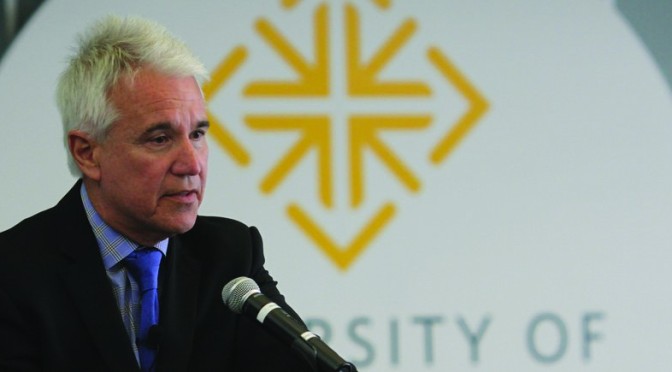Jeannine Abusharkh
Staff Writer
From high school dropout to San Francisco’s District Attorney, George Gascón shared his personal life story and spoke to the USF community on the death penalty and immigration while at the same time asking his audience to reflect on the meaning of leadership.
USF welcomed Gascón and Senator Arthur Torres on Tuesday, Sept. 16 to speak in celebration of National Constitution Day.
The Rev. Paul J. Fitzgerald, USF’s president, introduced Gascón as the nation’s first police chief and first Latin American man to become District Attorney of San Francisco.
When asked why it is important to to invite diverse thinkers to campus, Fitzgerald said, “We are a world class university anchored at the heart of a global city. We are properly and always will be the host of rigorous debates and vigorous analyses of proposed, tentative solutions to injustices, deprivations, and urgencies.”
Gascón began by giving his background as a Cuban immigrant. He grew up in a working class family in Los Angeles and dropped out of high school. In his adult life, Gascón began working in law enforcement with the Los Angeles Police Department. He worked hard to diminish racial bias and discrimination, especially in the Latino community. He moved to Northern California and became the Chief of Police. In 2010, George Gascón was appointed by then Mayor Gavin Newsom in the hopes of making San Francisco a safer community.
Gascón discussed the importance of leadership and said, “When leaders fail to lead bad things happen.” He sanctioned that leaders should “talk to the community and make things transparent.” Leaders are tasked with the duty to make issues and laws clear and easy for the community to understand.
Gascon is working hard to make things “transparent” through his position as District Attorney. Steps are being taken to break down cultural and language barriers that could stop victims and witnesses from interacting with law enforcement. Gascon is focusing on expanding “his office’s multilingual Victims Services Unit beyond the Hall of Justice and into community centers in the Mission, Chinatown, Tenderloin, and Bayview Hunters Point.” Offering these multilingual services will help not only to the community, but law enforcement officials as well by making them understand what is going on and how it affects people.
Senator Art Torres and Gascón began discussing a couple of topics ranging from immigration reform to the death penalty. One of the questions they discussed was “How will the government help young immigrants?” Gascón mentioned that people come to America to work and that the government must try and “evolve the constitution and reflect contemporary values.”
Senator Torres later brought up the topic of the death penalty and said, “Since 1978 California has spent $4 billion on death row appeals and costs.”
Gascón believes that the multiple layers to death sentencing do not make sense and that “capital punishment does not make the community any safer.”
The talk was turned over to the audience where one member asked Gascón, “Is there a way to reform the death penalty?” In response to this question he said, “There is no way to reform it because the system is frail and hard to fix.”
“The Catholic Church has long held that the death penalty can justifiably be used only in super rare instances, virtually none of which apply in California today in regards [to] death row inmates,” said Fitzgerald in an email interview with the Foghorn. “Putting to death even a person who has been convicted of a horrible crime makes all of us parties to a killing.”
One audience member hit Gascón with a controversial developing investigation about a recent shooting of a Latino man named Alejandro Nieto in Bernal Heights. He said that police officers “have the right to protect themselves” and are “authorized by law to use force,” and prosecutors must have “good, faith, and belief” and take admissible evidence to show a jury.
Sophomore Andriana Bravo, who is currently enrolled in an American Politics Class, said, “It was nice to hear what Gascón had to say and get to hear him speak on a more personal level.”

